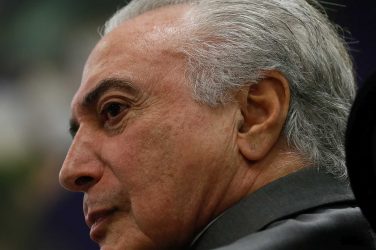 Brazil’s Congress has installed Michel Temer as the country’s new president. He had served as Brazil’s acting head of state since May, when Dilma Rousseff, the first woman president of the country, was temporarily ousted as a result of an impeachment case against her
Brazil’s Congress has installed Michel Temer as the country’s new president. He had served as Brazil’s acting head of state since May, when Dilma Rousseff, the first woman president of the country, was temporarily ousted as a result of an impeachment case against her
The ceremony took place in the Senate’s plenary room, which was packed with senators, deputies, former congress members and guests. Temer read the oath in which he swears to defend and respect the constitution. His inauguration speech was read next.
Temer is a jurist specialized in constitutional law, and has worked as a lawmaker for 25 years, in both elected and substitute posts. He was three times the leader of the Lower House, and was elected vice-president along with Dilma Rousseff in 2010, and re-elected in 2014.
The Brazilian Senate on Wednesday impeached suspended president Dilma Rousseff, and removed her from office for the rest of her term, ending a power struggle that has consumed the nation for months but has not solved any of its mounting problems, rather the contrary.

The Senate voted 61 to 20 the foretold death conviction of Rousseff on charges of manipulating the federal budget in an effort to conceal the nation’s mounting economic problems.
But the final removal of Rousseff, who was suspended in May to face trial, was much more than a judgment of guilt, was a verdict on her leadership and the slipping fortunes of Latin America’s largest country.
The result was celebrated with applause by allies of interim President Michel Temer, who sang the National Anthem. The result was announced by Supreme Court Chief Justice Ricardo Lewandowski, who presided the trial during the process at the Senate, which began on August 25.
Fernando Collor, the first Brazilian president elected by direct vote after the military regime, was the first head of government removed from presidency by impeachment proceedings in 1992. Dilma Rousseff is the second president removed from office by the same type process.
After they approved removing Dilma Rousseff from office, the Senate approved in a separate vote by 42 votes in favor, 36 against and 3 abstentions, that the former president’s political rights shall not be lost. With this result, she can hold public office.
The impeachment puts a definitive end to thirteen years of a governing by the populist Workers Party, PT, an era during which Brazil’s economy boomed, lifting millions into the middle class and raising the country’s profile on the global stage, but foundations proved to have been built on loose gravel.
In effect jumbo corruption scandals, particularly involving the ruling coalition with senior member PT, founded by Luiz Inácio Lula da Silva, the worst economic crisis in decades and the government’s weak deaf responses to the souring national mood opened Ms. Rousseff to withering scorn, leaving her with little support to fend off a power grab by political rivals and resurfacing dormant jealousies in her own party.
Even when Rousseff and her supporters describe the ouster as a coup, for critics the impeachment was the fitting fall for an arrogant leader at the head of a party that lost its way, preferring political alliances with “vipers” to remain in power, and accepting ingrained systemic practices contrary to the original principles when PT emerged as a gust of fresh air and hope over two decades ago.
Moreover the impeachment does not restore public confidence in Brazil’s leaders, or diminish the corruption that pervades in the country’s politics. To the contrary, many Brazilians note, it transfers power from one scandal plagued party to another.
In the midst of the months-long controversy, one of Brazil’s leading pollsters, but supportive of impeachment and with the purpose of downgrading Rousseff’s image, had to hide an opinion poll revealing that Brazilians were in effect fed up with Rousseff, but also with Temer and Lula and overwhelmingly favored fresh elections.
Everybody is convinced that Rousseff did not pocket a single real. She comes from a very rich family in Minas Gerais, where her father was one of Belo Horizonte’s leading notaries.
She is a technocrat, economist by training, with little patience for discussions, debate and dialogue. Her political mentor Lula picked Dilma to overcome ambitions inside his PT party, and which could in the future not need his shield.
Furthermore Rousseff’s first presidential election (2010) and re-election (2014) were masterminded by Lula, responsible for all the political network, and as he would say in the campaign, “Dilma is Lula with a skirt”. And equally significant she was PT’s candidate and not responsible for the extended Brazilian politics practice of illicit campaign financing.
But Rousseff, the technocrat, was energy minister, chair of Petrobras board, chief of staff next to Lula, and could not be ignorant of all the corruption, graft and patronizing practices of her boss and immediate advisors, several of which ended in jail together with top PT officials.
And the “plague” did not detonate with Petrobras. Already back in 2005, there was the “mensalão” scandal, paying a monthly stipend to members of congress to approve legislation, with funds skimmed from government. Then cabinet chief, José Dirceu, sentenced to twenty years of prison, had his office next to that of president Lula.
But in a more personal description, the technocrat, no nonsense Rousseff did not cultivate good relations with members of Congress, sometimes not even with her own party or coalitions allies. Her impatience contrasted with the charisma and ever friendly attitude of her boss, Lula.
Her autocratic persona and short temper became legendary in Brasília, a capital where back-room deals are customary when forging and nurturing alliances with an array of bickering parties. So when times got rough, alleged coalition associate members at the venal Congress had no problem in unsheathing swords.
Thus Rousseff found herself increasingly isolated in recent months, with many in her party quietly withdrawing their support. But said this, some in the party defended Rousseff as she made her last-ditch effort before the Senate this week.
Rousseff’s successor Michel Temer, 75, the interim president who served as vice-president before breaking with her this year, is now expected to remain in office until the end of the current term in 2018.
But Temer and his PMDB, Brazilian Democratic Movement Party, which has been the Workers’ Party’s governing coalition main ally for more than a decade, is also deeply enmeshed in the colossal graft schemes staining Brazil’s political system in recent years.
Since becoming interim president in May, Mr. Temer has had approval ratings nearly as dismal as Rousseff’s. Adopting a more conservative emphasis, he named a cabinet without any female or Afro-Brazilian ministers, outraging many in a country where more than 51% of people define themselves as black or mixed race, according to the 2010 census.
Several of the men named by Temer have already resigned under the cloud of scandal, including his anticorruption minister and his planning minister, amid claims that they were trying to stymie investigations into the bribery engulfing the national oil company, Petrobras.
Now president Temer was recently found guilty of violating campaign finance limits, a conviction that could make him ineligible to run for office for eight years. Beyond that, a construction executive has testified that Temer was the beneficiary of a US$ 300,000 bribe, an assertion Temer disputes.
The impeachment effort has divided the Brazilian nation and stirred passions on both sides. Of the four Brazilian presidents elected since Brazil’s democracy was re-established in the 1980s, Rousseff is the second to be forced from office through the impeachment process.
In 1992, Fernando Collor de Mello resigned before the Senate could convict him on corruption charges. He was replaced by Itamar Franco, a member of the PMDB.
It’s worth mentioning that Brazil’s first elected post military dictatorship president (1985), Tancredo Neves, died during emergency surgery on the day he was supposed to take office, and was replaced by vice-president José Sarney, also from the PMDB.
Rousseff will not go to jail after her conviction, but she expressed defiance throughout her trial, insisting that Brazil’s economic crisis was largely the result of shifts in the global economy that cut commodities prices.
With Rousseff removed, the Workers’ Party (PT), a dominant force in Brazilian politics for much of the past decade and a half, is now scrambling to find its way in a political landscape where conservative voices are growing more powerful.
João Santana, the party’s campaign strategist faces charges of illegally receiving millions of dollars in offshore accounts from the bribery scheme involving Petrobras. Even more damaging for the party, federal investigators are seeking graft charges against Lula, the former labor leader, founder of PT, who was president from 2003 to 2010.
The move adds to mounting legal problems faced by Lula, who is still signaling that he plans to run for president in 2018, but could be barred if investigations advance.
Rousseff’s Reaction
In an address delivered at the Alvorada Palace residence, former President Dilma Rousseff said she suffered the second coup d’État in her lifetime.
“The first, the military coup, backed by the brutality of weapons, repression, and torture, hit me when I was a young activist. The second, the parliamentary coup sealed today by means of a legal farce, removes me from the post to which I was elected by the people.”
Rousseff dubbed the approval of her impeachment by 61 senators against 20 an “unequivocal indirect election”, and vowed to appeal to every possible instance the decision she termed “fraud.” Near the end of her speech, she went on to affirm she would not bid farewell to the Brazilian people, but rather say “see you later.”
She noted that “the national progressive project, inclusive and democratic, which I stand for, is being brought to a halt by a powerful conservative and reactionary force, with the support of a factional and venal press. They will ensnare state institutions and put them to the service of the most radical economic liberalism and social backwardness.”
The coup was not mounted against her and her party, she argued. “The coup is against the social and union movements, which fight for rights in all of its definitions: the right to employment and to protective labor laws, the right to housing and to land, to education, to health care and to culture, to the young people who write their own history, the right of black people, the indigenous, the LGBT population, the women, the right to express one’s opinion without being repressed.
“The coup is against the people and against the nation. The coup is misogynistic. The coup is homophobic. The coup is racist. It is the imposition of the culture of intolerance, prejudice, and violence.”
She pointed out that, “for over 13 years, we have carried out a successful project that promoted greater social inclusion and the reduction of inequalities in the history of our country.”
Rousseff wrapped her address saying, “This is not how this story ends. I am convinced that the interruption of this process by the coup d’État is not a definitive one. We will return. We will return to resume our journey towards a Brazil where the people are sovereign. […] We will not bid farewell to you at this moment. I am sure I may say ‘see you later.’
“I conclude my speech by sharing with you these beautiful words of respite by Russian poet Mayakovski:
‘We’re not happy, this much is true,
But what reason do we have to feel sad?
The sea of history is full of turmoil
The threats and wars, we shall traverse them,
Break them asunder,
Cutting through them as does a keel.'”
Supreme Appeal
Rousseff’s defense said they will bring at least two actions to the Supreme Court (STF) questioning the impeachment process. According to Rousseff’s defense lawyer, former Justice Minister José Eduardo Cardozo, there is no cause for impeachment and there was denial of opportunities to be heard in several stages of the case.
“We will bring, at first, two actions, one to be taken out today and the other within a few days. We will discuss irregularities in the formal process, denial of opportunities to be heard, because senators have deliberated on the case before the defense could be heard,” explained Cardozo.
According to him, at the special commission, for example, several senators claimed that the defense could “do whatever it wanted” that the result had already been achieved. “This is a substantive violation to the legal process.”
The ousted president’s attorney added that there is no legal reason for the impeachment. “We will also question the lack of cause for the case, lack of motive. I know there are judges who have a more traditional view, in which an impeachment process cannot be reconsidered. In my view, this is an old [idea]. We have a more modern view,” he pointed out.
For Cardozo, the idea that the impeachment cannot be questioned puts at risk even Supreme Court justices and the prosecutor-general. “If we cannot reconsider the impeachment, tomorrow or any other day, Supreme Court justices or the prosecutor-general may be removed from office without the legal requirements. We are not discussing political merits, we question the lack of legal requirements established in the Constitution. “
For the former justice minister, today is a “sad day for democracy.” “It’s a sad day for democracy in Brazil where a legitimately elected president was removed from office without any constitutional basis or requirements, including the lack of requirements for due legal process.”
ABr/Mercopress












